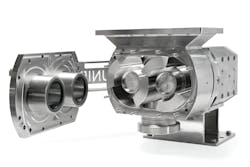Why stainless-steel pumps shine in processing applications
What you will learn:
- Why stainless-steel is the preferred material for pumps, especially in hygienic applications.
- The various grades of stainless alloys.
- The impact of surface finish on cleanability.
- The benefits of stainless-steel rotors.
In food processing, pharmaceuticals, and chemical manufacturing, reliable product transfer is critical. The pumps at the heart of plant operations need to be reliable. A stainless-steel pump offers excellent durability, corrosion resistance, and hygienic operation, making it an ideal choice for process engineers in these industries. Compared to pumps made of other materials, pumps constructed of stainless alloys have lower maintenance costs and a reduced total cost of ownership.
Does stainless-steel have good corrosion resistance?
Processing engineers understand that stainless-steel offers excellent corrosion resistance, making it suitable for processing equipment and settings with harsh environmental conditions. Stainless-steel pumps have a significantly longer service life, often lasting up to three times longer than carbon-steel alternatives. In fact, they can have a service life of as long as 30 years.
How does stainless-steel prevent corrosion?
The key to stainless-steel’s corrosion resistance lies in its composition. Chromium, present in concentrations above ten percent, forms a passive oxide layer that shields the material from oxidation and rust. Nickel and molybdenum in various grades of stainless alloys enhance resistance against chlorides, acids, and saltwater.
Common stainless grades used in hygienic pumps include:
- 304, a general-purpose grade with good corrosion resistance.
- 316, which contains molybdenum to improve resistance to pitting and crevice corrosion.
- 316L, a variant of 316 stainless-steel that has a lower carbon content, making it more resistant to carbide precipitation. In carbon precipitation, heat from welding may cause carbides to form, which weaken corrosion protection.
- Nitronic 60, a specialty grade of stainless-steel that combines corrosion resistance with superior wear resistance, making it an excellent material for avoiding galling on pump rotors.
All of these stainless grades are superior to standard carbon- steels for hygienic pumps.
What are the advantages of stainless-steel over steel?
Compared to carbon- steel, stainless-steel has higher strength and durability along with superior corrosion resistance. It also has a more attractive appearance than carbon- steel and provides superior corrosion resistance. It can withstand many (but not all) aggressive chemicals, high temperatures, and saline environments without coatings or cathodic protection.
Coating or cathodic protection can extend the life of a carbon- steel pump; however, maintaining the coating requires maintenance and entails a risk of failure. Over time, the coatings crack, peel, and wear off, requiring re-application. A failure of the cathodic protection or coating can lead to rapid corrosion. In contrast, coating a stainless alloy is not so problematic because if the coating wears off, the steel underneath is corrosion-resistant.
Sometimes stainless-steel is coated to enhance resistance to abrasion and galling. Chromium nitride is a hard ceramic coating that is safe for food processing applications. An added benefit is the coating’s low coefficient of friction, which improves the efficiency of rotating pump components.
Other significant advantages over carbon-steel pumps include reduced downtime and lower maintenance costs. Construction of stainless alloys enables longer maintenance intervals and less frequent part replacement. What’s more, unlike carbon-steel pumps, pumps made out of stainless-steel clean easily, resist staining, and maintain a polished surface for an extended time.
Maintain hygiene with stainless-steel pumps
In industries with strict cleanliness standards, stainless-steel helps maintain hygienic conditions with non-porous surfaces that do not harbor bacteria, mold, or contaminants. The polished finishes of stainless grades reduce surface roughness, preventing bacterial buildup and making cleaning easier.
The parameter, roughness average (Ra), is a measure of surface smoothness. It quantifies the average deviation from an ideal smooth surface and ranges from 250 to less than 4 µin. Typically, pump interior surfaces have Ra values in the range of 16 - 32 µin.
Cost savings
The smooth surface of a stainless-steel hygienic pump resists scaling and buildup, which prevents pump chambers from having narrowed diameters and inconsistent flow rates. By avoiding internal obstructions, these pumps allow for more efficient operation and reduced energy consumption, contributing to operational cost savings.
In addition, the high level of smoothness reduces friction on the product being pumped. This can contribute to higher flow rates and production efficiencies.
Plant maintenance managers appreciate that a stainless-steel pump reduces costly downtime due to repairs and replacement.
All-stainless-steel pump interiors
In recent years, food manufacturers have launched initiatives to eliminate plastic from their processes. This comes from a time when the industry was rocked by consumers discovering food contaminated with plastic. Some pump manufacturers responded by offering stainless-steel rotors, eliminating the chance that a plastic rotor could wear and deposit plastic into the product stream. Some suppliers went further and eliminated the need for o-rings, eliminating the chance they could become foreign object contamination (Figure 1). Food processors should know that there are pumps available having an all-stainless-steel interior.
In addition, some pump manufacturers offer pumps having housings fully machined from a single block of stainless steel, avoiding seams and welds where bacteria could accumulate. Also, this approach eliminates the chance of welding causing carbide precipitation.
About the Author
Calle Danielsson
Engineer with Unibloc Hygienic Technologies
Calle Danielsson is a sales engineer with Unibloc Hygienic Technologies, a manufacturer focused on sanitary pumps for food and beverage, pharmaceutical, bakery and confection, meat and poultry, brewery and transportation environments. He specializes in helping customers select the ideal pump for an application.
